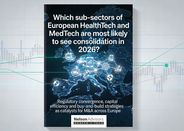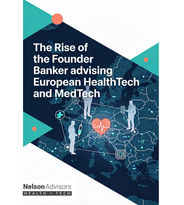Ambient Clinical Intelligence powered by Ambient Voice Technology: Top Funded StartUps and ScaleUps in the USA and Europe
- Nelson Advisors

- Oct 11, 2025
- 16 min read

Executive Summary: The Financialisation of Clinical Documentation
The Ambient Clinical Intelligence (ACI) sector, powered by Ambient Voice Technology (AVT), has transitioned rapidly from a nascent concept to a primary focus for large-scale venture capital deployment within enterprise healthcare. The underlying technology, rooted in Generative AI (GenAI), is fundamentally disrupting clinical workflows, promising to alleviate the persistent crisis of physician burnout driven by administrative documentation burden.
Synthesis of Findings and Key Investment Statistics
The market dynamics are characterized by unprecedented speed and scale in capital infusion, confirming ACI as the foremost application of GenAI in health systems. The analysis reveals a stark financial hierarchy dominated by two hyper-funded organisations: Abridge Inc. and Ambience Healthcare. These companies collectively command well over $1 Billion in total funding raised through mid-2025. This rapid and massive investment confirms that ACI is no longer viewed as a marginal tool but as a "must-have" utility for large integrated health systems.
The pace of growth is best exemplified by Abridge, which secured a remarkable $300 Million Series E round in June 2025, elevating its valuation to $5.3 Billion. This exponential increase in valuation and funding velocity signals profound investor confidence in the organisation's ability to not only capture significant market share but also to integrate deeply into core clinical and revenue cycle management (RCM) workflows.
The strategic imperative driving this financial momentum is the market's shift beyond simple AI-powered dictation towards Agentic AI. This advanced capability allows systems to handle complex, end-to-end tasks, including automated documentation, proactive coding suggestions, revenue cycle functions, and compliance assurance. Organisations that can prove high reliability and utility across the entire clinical and financial spectrum are attracting the largest valuations.
Top 10 Ranking Snapshot By Total Capital Raised
The following table summarises the financial hierarchy within the ACI sector, based on available funding disclosures through 2024 and 2025.
Rank | Company | Est. Total Funding (USD) | Latest Funding Round | Valuation (Est.) | Key Investors & Status |
1 | Abridge Inc. | $773M - $800M | Series E ($300M, Jun 2025) | $5.3 Billion | Andreessen Horowitz (a16z), Khosla Ventures |
2 | Ambience Healthcare | $313M | Series C ($243M, Jul 2025) | $1 Billion | OpenAI Startup Fund, Kleiner Perkins, Oak HC/FT |
3 | Suki AI | $165M | Series D ($70M, Oct 2024) | ∼283M (Series D Post-Money) | N/A (VC backed) |
4 | Augmedix | $158.5M | Various (Pre-acquisition, 2023) | Acquired ($$$139M, 2024) | HCA Healthcare, Redmile Group (Exit Benchmark) |
5 | Nabla | $120M | Series C ($70M, Recent) | N/A | HV Capital, Highland Europe |
6 | Heidi Health | ∼100M | Series B ($65M, Recent) | $465 Million | Point72 Private Investments |
7 | DeepScribe | $60M | Series A ($30M, Jan 2022) | N/A | Index Ventures |
8 | Tandem Health | $59.5M | Series A ($50M, Jun 2025) | N/A | Kinnevik, Northzone, OpenAI |
9 | Freed AI | $34M | Series A ($30M, Mar 2025) | N/A | Sequoia Capital, Scale Venture Partners |
10 | Emerging Pipeline | <$30M | N/A | N/A | N/A |
The Foundational Shift: Ambient Voice Technology (AVT) and Generative AI in Healthcare
Ambient Voice Technology, operating under the broader framework of Ambient Clinical Intelligence (ACI), represents a paradigm change in how technology interacts with clinical practice. This shift is essential to understanding why capital is flowing into the sector at such high volumes.
Defining Ambient Clinical Intelligence (ACI)
ACI is a realisation of "pervasive infusion of AI that is seamlessly embedded into the ways we live and work," moving away from previous technological solutions that required clinicians to actively inject data into systems. In healthcare, ACI is fundamentally the driving force aimed at restoring the core satisfaction of medical practice and improving patient engagement.
These AVT solutions, commonly termed "ambient scribes," utilise automated speech recognition (ASR) combined with sophisticated large language models (LLMs) to passively "listen" to clinical consultations. Their core function is to convert the natural, free-flowing audio interaction between a patient and a physician into structured, clinical documentation, often generating a draft of the medical note. The transformative goal is explicitly to remove the cognitive burden associated with concurrent or post-visit Electronic Health Record (EHR) data entry, allowing physicians to be more present and conversational with patients.
Technological Drivers and the LLM Convergence
The convergence of technological innovations, particularly in mobile devices, the Internet of Things (IoT), and advanced computing power, set the stage for ACI adoption. However, Generative AI (GenAI) is the primary catalyst. ACI solutions represent the first large-scale application of GenAI within health systems, leading to adoption speeds significantly faster than historically observed in the notoriously slow-moving health IT industry.
Specialised ambient GenAI tools, such as Nuance DAX, Speke, and Tandem Health, leverage LLMs to process the conversational audio. The capability of LLMs to summarize complex clinical data and generate tailored, structured responses in various documentation styles is paramount to alleviating documentation pressure.
While GenAI offers immense utility, its power introduces significant challenges. Reliance on LLMs carries inherent risks concerning the quality of source data, which may introduce systemic biases, or the generation of entirely false information, known as "hallucinations". Addressing this critical safety challenge is becoming a primary differentiator. Suki AI, for instance, explicitly mitigates this risk by focusing on "Evidence-linked documentation" designed to reduce hallucinations and bias, ensuring content is clinician-reviewed before integration into the EHR. This emphasis on clinical safety and reliability is a necessary feature for achieving widespread, trusted adoption among large, risk-averse health systems.
Quantifying the Value Proposition: Operational and Human Impact
The aggressive funding environment is directly tied to the quantifiable, significant return on investment (ROI) that ACI solutions deliver, particularly in addressing the physician burnout crisis. Reported outcomes demonstrate substantial improvements in the clinical environment. Clinicians using ACI solutions report a 70% improvement in work-life balance and an 80% reduction in cognitive burden and fatigue. These human benefits translate directly into crucial efficiency gains. On average, physicians save 5 minutes per patient encounter, accumulating to substantial recovered time throughout a clinic day. Furthermore, the non-clinical value is equally compelling: 93% of patients surveyed indicate that their physician is "more personable and conversational" when using the technology, proving that ACI successfully shifts the clinician's focus back to the patient rather than the computer screen.
The speed of ACI adoption, accelerating faster than nearly any other recent technology deployment in healthcare, suggests that health system leadership views the administrative burden and resulting clinician burnout as an immediate, existential crisis. The necessity for rapid deployment of solutions that guarantee a high return in human capital retention, as demonstrated by the 70% work-life improvement, is fuelling the competitive drive for large funding rounds. Consequently, the competitive edge is shifting away from merely accurate automatic speech recognition (ASR) to ensuring full regulatory compliance, auditability, and deep EHR integration. The risk associated with Generative AI (hallucinations) requires high engineering standards, making features like Suki’s evidence-linked documentation critical for enterprise adoption that secures the competitive advantage.
The ACI Funding Landscape: Tracking the Digital Health Mega-Rounds
The capital influx into ACI must be viewed within the context of the broader, resilient digital health venture capital ecosystem of 2024 and 2025.
2024-2025 Digital Health VC Trends
Despite global economic volatility, the digital health sector has shown resilience. Funding in 2025 reached $9.9 Billion through the third quarter, surpassing the $8.4 billion raised during the same period in 2024. This robust activity is largely attributable to the phenomenon of "mega-rounds" (deals worth $100 million or more). These mega-deals accounted for approximately 40% of the total digital health investment in 2025, reaching $3.8 billion. Abridge and Ambience are prime examples of this trend, successfully securing enormous financing to rapidly scale.
Investment prioritisation is clearly concentrated in technology categories that automate core processes using AI. The top three funded value propositions—non-clinical workflow, clinical workflow (both raising $1.9 billion), and data infrastructure ($893 million)—account for over half of all digital health funding. ACI solutions, which span both clinical and non-clinical documentation, sit at the intersection of these two most lucrative investment categories.
The Established Incumbent: Nuance Communications (Microsoft)
While the focus of this analysis is on emerging venture-backed scaleups, Nuance Communications, now a part of Microsoft, sets the crucial benchmark for market maturity and enterprise readiness. Nuance DAX utilizes specialized GenAI tools to "listen" to consultations and generate notes.
Nuance, founded in 1992, is an established enterprise software provider, operating as a public company with estimated revenue of $1.25 Billion prior to its acquisition. Its status validates the overall market demand but also establishes a high competitive floor, particularly regarding product maturity and integration depth. Nuance DAX is widely known for its "Deep Epic" and Meditech integration capabilities, setting the necessary standard for any scaleup seeking major health system contracts.
The existence of Nuance, and its acquisition by a technology giant, signals to investors that high-value, market-dominant exit opportunities are achievable in the ACI space. This validation was reinforced by the acquisition of Augmedix, which had raised $158.5 million before being bought by Commure for $139 million in 2024. This transaction provided a tangible, high-profile exit precedent, validating the investment thesis that successful ACI companies—even if not reaching IPO scale, are desirable targets for established health IT vendors seeking to quickly acquire GenAI capabilities and an installed user base.
The Thesis Behind Scale: Capitalising on Integration and Compute
The massive capital accumulation by Abridge and Ambience is not simply for marketing; it is essential for enterprise scaling. These large Series C and E rounds fund several high-cost necessities: securing complex enterprise contracts, navigating notoriously long sales and implementation cycles, and, most critically, continuous investment in proprietary, specialised LLMs optimised for nuanced medical language and specific documentation styles.
The ACI funding competition is fundamentally a strategic acquisition race for deep, functional EHR integration. Leading firms like Suki emphasize their "Deepest integration with EHRs," specifically naming major enterprise platforms such as Epic, Oracle Health, and MEDITECH. The enormous funding rounds secured by the top-tier players are intrinsically linked to the high engineering and compliance costs associated with securing reliable, deep integration needed to deploy across major health systems. This technical achievement creates a powerful competitive moat, significantly outweighing the core AI model itself in enterprise decision-making.
Abridge's soaring valuation of $5.3 Billion suggests investors are applying a substantial revenue multiple, betting that the company can rapidly evolve its technology from a simple documentation tool into an indispensable layer of the health system's operating infrastructure. This valuation is based on the expectation that deep EHR integration and expanded capabilities, such as revenue cycle intelligence—will ensure long-term, utility-level market capture.
Deep Dive: Top 10 Most Funded Ambient Voice Technology Startups/Scaleups
This section profiles the leading AVT scaleups, detailing their financial profiles and strategic differentiation, based on the total capital raised.
A. Tier-1 Leaders: The Platform Builders ($>300M Raised)
Abridge Inc. (The Velocity Leader)
Abridge has demonstrated unmatched financial velocity in the sector, raising approximately $773 million to $800 million in total funding. The company's rapid acceleration culminated in a $300 million Series E round in June 2025, led by Andreessen Horowitz and Khosla Ventures, pushing its valuation to a reported $5.3 billion. The timeline is significant: this Series E closed just four months after its prior Series D round.
Abridge positions itself as a provider of an AI-based health record platform that converts natural conversation into a structured clinical note draft in real time, leveraging a proprietary data set derived from over 1.5 million medical encounters. Its current strategic focus is expansion, including support for inpatient notes and orders within Epic, and the crucial plan to embed revenue cycle intelligence earlier into the clinical conversation.
Ambience Healthcare (The Full-Cycle Agent)
Ambience Healthcare has secured its status as a market unicorn, raising $313 million in total funding. This total is anchored by an enormous $243 million Series C round in July 2025, which immediately granted the company a $1 Billion valuation. Its investor base includes notable names such as Kleiner Perkins, Oak HC/FT, and, significantly, the OpenAI Startup Fund.
Ambience markets its product as a comprehensive, connected system that supports the entire clinical workflow: pre-visit, during-visit (Ambient Scribe), and post-visit. Its core strategic differentiation lies in its Post-Visit suite, which applies coding logic and compliance intelligence to generate "audit-ready, revenue-optimized documentation". This focus on end-to-end compliance and revenue capture allows Ambience to position its offering as a revenue integrity tool, going beyond simple time savings.
Tier-2 Scaleups: The Differentiated Players ($100M - $300M)
Suki AI (The Integration Standard)
Suki has raised a total of $165 million, following a $70 million Series D funding round announced in October 2024. This round placed its post-money valuation at approximately $283 million.
Suki’s primary strategic emphasis is on the robustness of its platform and superior EHR integration capabilities. The company explicitly claims to set the "standard for what's possible for EHR integrations," highlighting full integration with major enterprise systems including Epic, Oracle Health, athenahealth, and MEDITECH. Suki’s platform is designed as a "true assistant," encompassing ambient documentation, dictation, ICD-10 and HCC coding, order staging, patient summaries, and Q&A. The incorporation of evidence-linked documentation also serves as a critical clinical safety measure against LLM hallucinations.
Augmedix (The Exit Benchmark)
Augmedix raised $158.5 million across multiple funding rounds leading up to its acquisition. Before the exit, the company also executed a NASDAQ uplift offering in 2021. Augmedix was acquired by Commure for $139 million in 2024.
Augmedix represents the first generation of successful digital scribing solutions, often utilizing a hybrid AI/human approach. Its acquisition serves a crucial function in the ecosystem: providing a high-profile M&A valuation marker for the ACI sector, confirming the investment thesis regarding viable exits for companies achieving significant scale and adoption.
Nabla (The Agentic Pioneer)
Nabla has raised a total of $120 million, boosted by a recent $70 million Series C round. The company is trusted by over 130 healthcare organizations and 85,000 clinicians.
Nabla's strategic focus is on evolving beyond a mere documentation tool into an adaptive, "Agentic AI" platform. Agentic AI is designed to go deeper into clinical workflows by supporting advanced coding tasks, generating agentic EHR commands, and assisting a wider range of clinical roles. This specialsation is key to delivering measurable ROI across complex clinical and financial processes.
C. Fast Followers and Regional Contenders ( $<$100M)
The market reveals a clear bifurcation in funding strategy. While Abridge and Ambience utilize hyper-funding to dominate the complex US enterprise EHR market, other well-funded scaleups focus on geographical advantages and specialised niches.
The fact that the OpenAI Startup Fund is listed as an investor in both Ambience Healthcare and the European scaleup Tandem Health suggests a strategic technical alignment, potentially granting these firms a deep technological advantage through preferential access to or collaboration on foundational models.
Heidi Health: This Australian-based company has raised approximately $100 million in total funding, securing a $65 million Series B round, valuing the company at $465 million. Its strategic ambition is international expansion, focusing on challenging, fragmented markets across the USA, UK, Canada, France, and other global regions.
DeepScribe: The company has raised $60 million, driven by a $30 million Series A round in January 2022. DeepScribe competes by offering robust scribe software with necessary EHR compatibility.
Tandem Health: Based in Stockholm, Tandem Health is leading the European market charge. It recently raised a significant $50 million Series A round in June 2025, bringing its total funding to $59.5 million. Its early success includes rapid deployment across Europe, including a partnership with Accurx in the UK, reaching over 200,000 NHS professionals. This scaling demonstrates a high-potential, specialized acquisition path for vendors focusing on complex, non-US health systems.
Freed AI: Freed recently secured a $30 million Series A round in March 2025 (total funding $34 million), backed by Sequoia Capital. The company focuses on delivering instant clinical documentation for thousands of clinicians.
Competitive Dynamics and Strategic Positioning
The competitive battleground in ACI is defined by two primary dynamics: achieving non-negotiable EHR interoperability and migrating from simple dictation functionality to complex, revenue-driving Agentic AI.
The Interoperability Barrier: EHR Integration as a Core Asset
For top-funded ACI firms, deep and reliable integration with dominant EHR platforms—primarily Epic, Oracle Health, and MEDITECH, is the minimum entry requirement for securing large-scale health system contracts.
Suki's explicit claim of setting the standard for broad, certified EHR integrations underscores the market's emphasis on platform robustness over core AI novelty. This integration is complex because it must ensure documentation is not only accurate but also correctly structured and compliant with the EHR’s native documentation standards. Failure in this area leads directly to required manual rework, which clinicians cite as a major barrier to adoption. The high capital deployed by Tier-1 companies is necessary to acquire the engineering talent and proprietary datasets to achieve this seamless, non-disruptive interoperability, which is far more critical for enterprise sales than basic functionality.
B. Product Differentiation: From Scribe to Agentic AI and RCM Integration
The current funding landscape reflects a consensus that simple documentation is insufficient; the next generation of ACI must address the financial integrity of the clinical encounter.
The Evolution to Agentic Workflow: Leading firms are rapidly moving away from simple AI scribing toward providing complex, multi-step assistance, defining their offerings as Agentic AI. This shift involves the AI initiating and completing clinical and administrative actions based on conversational input, rather than merely producing a draft.
Focus on Revenue Cycle Management (RCM): A key strategic differentiator is the integration of RCM logic directly into the clinical documentation process. Ambience Healthcare is a pioneer in this area, utilising its Post-Visit suite to apply "coding logic, compliance intelligence" to generate "revenue-optimised documentation" that produces "cleaner claims from the start". Abridge has also identified RCM integration as a future expansion point. By linking documentation directly to financial outcomes, these firms elevate their status from a discretionary expense to an indispensable financial utility layer.
This focus on compliance and financial integrity explains why enterprise health systems are willing to pay premium prices for solutions offered by the top-funded players (e.g., Nuance DAX at up to $830/mo, Suki at $299/mo) , rather than adopting low-cost alternatives. The high price is justified by the promise of improved revenue integrity, decreased risk of audits and queries, and reliability that minimises the chance of manual rework for already overburdened clinicians. The competitive edge is thus determined by the ability to generate a clinical note draft that is not only accurate but audit-ready and compliant, requiring near-zero correction.
Governing the Future: Ethical, Regulatory, and Clinical Challenges
For ACI technology to achieve widespread deployment across risk-averse health systems, the massive capital investment must be paired with rigorous oversight addressing inherent ethical, regulatory, and safety risks.
Privacy and Data Governance: The Continuous Monitoring Dilemma
Ambient intelligence requires the continuous collection of substantial amounts of audio and sensor data in patient care settings. This presents immediate ethical challenges concerning privacy, data management, potential bias, and informed consent.
The deployment of these systems forces health systems to navigate complex legal risks. Existing state laws regarding consent for audio recordings were not designed for continuous, ambient AI monitoring, leading to ambiguity in implementation. Compliance is crucial, but health systems must also provide transparency regarding the AI's use to maintain public trust and provide patients the opportunity to make informed decisions about their personal information.Regulatory frameworks are playing catch-up, and careless implementation of ACI may introduce novel legal risk profiles if compliance and auditability are not strictly managed through the platform.
The Accuracy Mandate and Clinical Safety
The use of Large Language Models introduces unique clinical safety risks that must be mitigated by top-tier ACI providers. A major concern is the possibility of LLMs introducing outright false information, or "hallucinations," or skewed recommendations resulting from inherent bias in the training data. The conversational nature of the AI output can make users susceptible to misinformation, posing risks to patient safety.
The scale of funding directly correlates to the ability of a company to achieve clinical accuracy. Abridge’s claim of deriving its technology from over 1.5 million medical encounters and supporting 55 specialties is evidence that the massive capital raises are essential for acquiring and processing the proprietary training data required to specialize the LLMs. This huge, specialized data volume is necessary to minimize generalization errors and hallucinations, which, in turn, builds clinical trust and reduces the burdensome need for manual corrections. Rigorous oversight and careful implementation are necessary to ensure accuracy, ethical integrity, and alignment with established clinical standards.
Adoption Roadblocks and Change Management
Beyond technology and compliance, clinician adoption remains a critical practical hurdle. Resistance to adopting ambient voice technology often stems from a fear of disrupting established practices and specific anxieties regarding the technology itself.
Major barriers include:
Privacy Apprehension: Clinicians are often concerned about potential patient privacy breaches associated with constant audio monitoring.
Accuracy and Rework: Doubts about the AI’s accuracy create the fear of subsequent manual rework, which negates the time-saving benefit.
Training Burden: The challenge of allocating valuable clinic time for training and ensuring ongoing technical support remains a practical operational concern.
Successful deployment requires health systems to manage this change by proving that the AI's documentation is indeed audit-ready and requires minimal correction, thereby ensuring high clinician engagement and trust.
Outlook and Strategic Recommendations
The ACI market is defined by a high-stakes, hyper-capitalized race to capture the enterprise utility layer of clinical workflow. The future trajectory suggests rapid consolidation and the increasing necessity for deep strategic partnerships.
Market Growth Projections (2026-2030)
The high funding velocity of Abridge and Ambience signals that market consolidation is imminent. These leaders possess the capital reserves necessary to acquire smaller, specialized competitors that hold niche RCM expertise or strong regional deployment advantages (such as Tandem Health in Europe).
A key factor to watch is the response of incumbent EHR giants. To prevent rivals from gaining platform-level dominance through deep integration, EHR vendors will likely accelerate M&A activities, seeking to integrate ACI capabilities natively or secure exclusive partnerships with the leading scaleups.
Recommendations for Health Systems (Adoption Criteria)
For health system Chief Strategy Officers and Chief Information Officers, strategic ACI adoption must adhere to criteria that extend beyond superficial convenience:
Prioritise Agentic Capabilities and RCM Integration: Solutions must demonstrate measurable financial ROI by extending utility beyond simple documentation to proactively supporting coding, compliance, and core revenue cycle functions. Choosing a system based solely on time saved, without verifying RCM benefit, presents a suboptimal investment.
Demand Proven Interoperability Depth: Rigorous due diligence is mandatory regarding the depth and reliability of integration with core EHR systems (Epic, Oracle Health, etc.). Compatibility is insufficient; the system must demonstrate high-speed, compliant, and rework-free integration.
Establish Robust Data Governance: Clear, auditable protocols for informed consent, data privacy, and continuous audio capture must be developed and strictly enforced. Mitigation strategies for LLM risks (hallucinations, bias) should be central to the vendor selection process to manage ethical and legal risk.
Recommendations for Investors (Risk/Reward Analysis)
For venture capital funds evaluating the ACI landscape, strategic guidance should focus on long-term technological moats and verifiable utility:
Focus on the Utility Layer: The investment thesis should favor companies that can prove their transition from a documentation feature to a non-discretionary utility layer, deeply embedded in the health system’s RCM and clinical command structures (e.g., Abridge and Ambience).
Monitor Geopolitical Niches: Significant opportunities exist in fast-scaling players that successfully navigate complex, highly regulated non-U.S. markets (e.g., Tandem Health’s NHS focus). These firms present high-value, specialised acquisition targets for major health tech platforms seeking global expansion.
Evaluate Technical Moats Beyond Funding: Capital alone is not the sole differentiator. Investors must rigorously assess the true technological moat, specifically focusing on proprietary LLM training data derived from vast, specialised encounter volumes and strategic technical alignment, such as partnerships with foundational AI providers (like OpenAI, as noted with Ambience and Tandem).
Nelson Advisors > MedTech and HealthTech M&A
Nelson Advisors specialise in mergers, acquisitions and partnerships for Digital Health, HealthTech, Health IT, Consumer HealthTech, Healthcare Cybersecurity, Healthcare AI companies based in the UK, Europe and North America. www.nelsonadvisors.co.uk
Nelson Advisors regularly publish Healthcare Technology thought leadership articles covering market insights, trends, analysis & predictions @ https://www.healthcare.digital
We share our views on the latest Healthcare Technology mergers, acquisitions and partnerships with insights, analysis and predictions in our LinkedIn Newsletter every week, subscribe today! https://lnkd.in/e5hTp_xb
Founders for Founders > We pride ourselves on our DNA as ‘HealthTech entrepreneurs advising HealthTech entrepreneurs.’ Nelson Advisors partner with entrepreneurs, boards and investors to maximise shareholder value and investment returns. www.nelsonadvisors.co.uk
#NelsonAdvisors #HealthTech #DigitalHealth #HealthIT #Cybersecurity #HealthcareAI #ConsumerHealthTech #Mergers #Acquisitions #Partnerships #Growth #Strategy #NHS #UK #Europe #USA #VentureCapital #PrivateEquity #Founders #BuySide #SellSide#Divestitures #Corporate #Portfolio #Optimisation #SeriesA #SeriesB #Founders #SellSide #TechAssets #Fundraising #BuildBuyPartner #GoToMarket #PharmaTech #BioTech #Genomics #MedTech
Nelson Advisors LLP
Hale House, 76-78 Portland Place, Marylebone, London, W1B 1NT
Meet Us @ HealthTech events
Digital Health Rewired > 18-19th March 2025 > Birmingham, UK
NHS ConfedExpo > 11-12th June 2025 > Manchester, UK
HLTH Europe > 16-19th June 2025, Amsterdam, Netherlands
Barclays Health Elevate > 25th June 2025, London, UK
HIMSS AI in Healthcare > 10-11th July 2025, New York, USA
Bits & Pretzels > 29th Sept-1st Oct 2025, Munich, Germany
World Health Summit 2025 > October 12-14th 2025, Berlin, Germany
HealthInvestor Healthcare Summit > October 16th 2025, London, UK
HLTH USA 2025 > October 18th-22nd 2025, Las Vegas, USA
Web Summit 2025 > 10th-13th November 2025, Lisbon, Portugal
MEDICA 2025 > November 11-14th 2025, Düsseldorf, Germany
Venture Capital World Summit > 2nd December 2025, Toronto, Canada



















































Comments